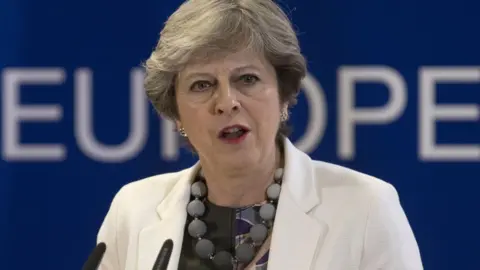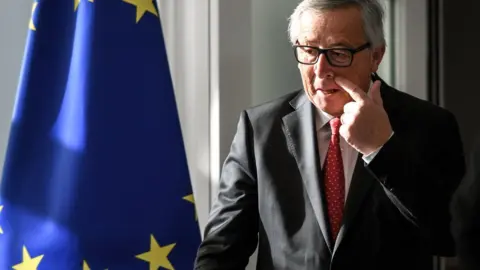Brussels 'unusually optimistic' ahead of May visit

 Getty Images
Getty ImagesBrussels is in an upbeat mood. Which is rather rare when it comes to Brexit.
In fact, I've been taken aback by the positive tone of my many conversations.
Suddenly, after hearing endless EU complaints about perceived foot-dragging by London during these grey and grumpy months of Brexit negotiations, EU diplomats spoke to me this weekend of "movement", "traction" and a "lack of negativity" in the frantic last-minute talks ahead of Monday's visit by Theresa May.
Of course, this might all be misplaced optimism. After all, as both the UK and EU love to point out, nothing is agreed until everything is agreed and that won't be until autumn next year but...
What's at stake here is not a final Brexit deal but whether Brexit negotiations can now widen to include talk of a transition deal and the future shape of EU/UK relations (in or out of the single market and customs union etc).
That depends on whether the EU deems that "sufficient progress" has been made on citizens' rights, Ireland and the financial settlement.
Diplomats reached broad agreement on money and citizens over the weekend.
 Getty Images
Getty ImagesI understand some sovereignty issues are still outstanding on citizens' rights but one EU source told me: "The Brits gave us pretty much everything we asked for."
Ireland remains the outstanding issue.
Dublin wants written assurances from Downing Street that the Good Friday Agreement will be protected and that there will be no re-introduction of a hard border between the Republic of Ireland and Northern Ireland.
The search for political wording acceptable to all sides continued throughout the night.
Brussels deemed it a good omen on Sunday when Arlene Foster, the leader of the DUP - a unionist party in Northern Ireland that supports Theresa May's government in Westminster - said she was in favour of a "sensible Brexit".
The EU has told member state Ireland that it has the final say in any part of the Brexit agreement that pertains to the Irish border but Prime Minister Leo Varadkar seems loath to use his veto.
In trade terms alone, Ireland believes it has more to lose than any other EU country, if there is a no-deal scenario post-Brexit.
This is why so much is riding on Monday on Theresa May's lunch with EU Commission chief Jean Claude Juncker.
 Getty Images
Getty ImagesBlood, sweat and tears of negotiating teams aside, the prime minister's personal assurances will be sought in Brussels, on Ireland and other matters.
If all goes smoothly, a joint UK-EU report is being drawn up for publication later in the day to lock in all Brexit understandings agreed to date.
A sure sign that the commission is feeling confident is Jean-Claude Juncker's invitation to European Parliament representatives to meet ahead of Theresa May's arrival.
The parliament is particularly exacting when it comes to citizens' rights and it has a Brexit deal veto.
The European Commission president clearly feels he has enough in his pocket to get them on board.
All EU sources I have spoken to described themselves at the very least as "cautiously optimistic" ahead of the prime minister's arrival.
So much so, that EU diplomats tell me they're already debating the "what next?"
What mandate should the lead EU negotiator Michel Barnier be given by Europe's leaders at their mid-December summit if there is a green light to proceed to Brexit Phase 2?
There is heated debate right now as to whether Mr Barnier will first be instructed to talk transition deals with the UK and only later - in March next year - have his mandate widened to include negotiations on the future shape of EU-UK relations, which would touch on trade, of course.
Brussels may be feeling Brexit-buoyant at the start of the day but if all goes according to their plan - and that, I stress, is by no means a fait accompli - there will be pockets of disgruntlement amongst those in the UK who view the government as caving in to EU demands and amongst EU countries like Germany that are more cautious than the EU Commission about leaping in to the realms of Brexit Phase 2.
